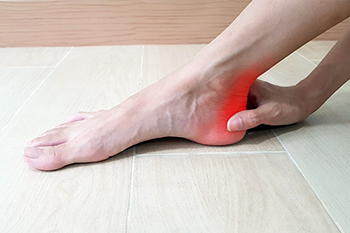
The Achilles tendon connects the heel bone to the calf muscles at the back of the ankle. Pain at this location of the leg and foot can be caused from a partial or complete tear, or rupture of the tendon or tendinitis (also known as tendinosis or tendinopathy). Achilles tendinitis can happen when the tendon becomes inflamed. There can be non-insertional Achilles tendinitis, where the fibers in the middle of the tendon become inflamed or insertional Achilles tendinitis, when the fibers in the lower tendon become inflamed. Achilles tendon pain can result in discomfort, swelling in the heel, stiffness in the legs and heel, and restriction of one’s movement. It can occur from excessive or repetitive stress on the ankles and feet. Those who play sports that involve rapid changes in direction or one who suddenly increases the intensity of their exercise are prone to such injuries. This pain can also come on from wearing inappropriate footwear, running on uneven surfaces, foot abnormalities, older age, or being overweight. If you have Achilles tendon pain, consult with a podiatrist who can properly diagnosis and treat it.
Achilles tendon injuries need immediate attention to avoid future complications. If you have any concerns, contact Emmanuel Bustos, DPM of New York. Our doctor can provide the care you need to keep you pain-free and on your feet.
What Is the Achilles Tendon?
The Achilles tendon is a tendon that connects the lower leg muscles and calf to the heel of the foot. It is the strongest tendon in the human body and is essential for making movement possible. Because this tendon is such an integral part of the body, any injuries to it can create immense difficulties and should immediately be presented to a doctor.
What Are the Symptoms of an Achilles Tendon Injury?
There are various types of injuries that can affect the Achilles tendon. The two most common injuries are Achilles tendinitis and ruptures of the tendon.
Achilles Tendinitis Symptoms
- Inflammation
- Dull to severe pain
- Increased blood flow to the tendon
- Thickening of the tendon
Rupture Symptoms
- Extreme pain and swelling in the foot
- Total immobility
Treatment and Prevention
Achilles tendon injuries are diagnosed by a thorough physical evaluation, which can include an MRI. Treatment involves rest, physical therapy, and in some cases, surgery. However, various preventative measures can be taken to avoid these injuries, such as:
- Thorough stretching of the tendon before and after exercise
- Strengthening exercises like calf raises, squats, leg curls, leg extensions, leg raises, lunges, and leg presses
If you have any questions please feel free to contact our office located in New York, NY . We offer the newest diagnostic tools and technology to treat your foot and ankle needs.